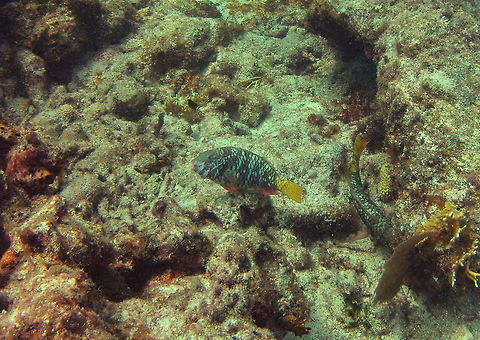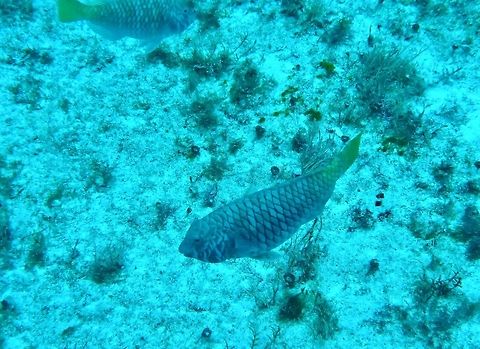
Appearance
Parrotfish can be recognised by their beak-like fused teeth which are a tightly packed mosaic. The yellowtail or redfin parrotfish occurs in two colour phases. The terminal phase is the mature male with blue to green colour, a black spot at the base of the pectoral fin, and the tail fin with a yellow centre and translucent margin. The drab or initial phase includes either mature females or immature males, and has a light grey-brown colour with a white ventral region, alternate dark and pale bars a long the chin, a yellow caudal peduncle (fin base) and tail fin, and red anal and pelvic fins. The juvenile has a mottled pattern. Fins include ten dorsal soft rays, nine dorsal spines, three anal spines and three anal soft rays. The length of the fish is 48 cm in adult males (Randall, 1996).
Naming
SynonymsSacrus brachyvarius Longley, 1941
Scarus circumnotatus Poey, 1861
Scarus emarginatus Poey, 1868
Scarus rubripinnis Valenciennes, 1840
Scarus truncatus Poey, 1868
Sparisoma pachycephalum Longley, 1941
Sparisoma rhomaleum Meek & Hildebrand, 1928
Sparisoma rubripinnis (Valenciennes, 1840)
Common Names:
English – Redfin Parrotfish, Roughscale Parrot, Yellowtail Parrotfish, Roughscale Kwob
Spanish – Jabón, Loro Aletirojo, Loro Basto, Loro Coliamarilla, Loro Pardo
French – Perroquet Basto
Distribution
This species is found from Massachusetts (USA) and Bermuda to Venezuela. It is also found in the eastern Atlantic, from Senegal to the Gulf of Guinea.Habitat
This species is reef and seagrass associated from 1-15 m. It occurs in shallow coral and rocky reefs, and seagrass beds. It prefers high energy areas of the reef. It is a protogynous hermaphrodite. It feeds on benthic algae and seagrass.♦ Lower depth limit (metres): 15
♦ Upper depth limit (metres): 1
References:
Some text fragments are auto parsed from Wikipedia.
http://www.iucnredlist.org/details/190721/0https://sta.uwi.edu/fst/lifesciences/documents/Sparisoma_rubripinne.pdf